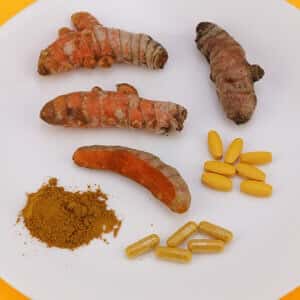
One of the hottest supplements in the health food store these days is curcumin. Like this reader, you may want to know why. Listen to next Saturday’s syndicated radio show to get the very latest update from one of the country’s leading experts on curcumin research!
Q. I have been hearing about the significant benefits of curcumin, an extract of turmeric. What are they?
A. Turmeric is a spice commonly used in Asian cooking. It is the yellow spice in curry, for example. Curcumin is believed to be its most active ingredient.
There are more than 7,500 scientific publications on curcumin, but much of the research for human health is still preliminary.
Anti-Inflammatory and Anti-Cancer Activity
Curcumin has been shown to have anti-inflammatory activity (Endocrine, Metabolic and Immune Disorders Drug Targets, online March 16, 2015). It is being tested against several types of cancer and has been shown to boost the effectiveness of a chemo drug for colorectal cancer (Carcinogenesis, March, 2015).
Janet sent a glowing testimonial:
“Curcumin (turmeric) I believe has saved my husband’s life. He was diagnosed with pancreatic cancer in 2010 and given three months to live. I read the MD Anderson was undergoing trials with curcumin and decided to put him on it. Well, he is alive and well 4 years later – when 95 percent of pancreatic cancer patients die before 12 months.”
We don’t recommend taking curcumin for cancer except under medical supervision. It might interact with the medications in an unpredictable way, and it is better to have guidance.
Fighting Alzheimer’s, Arthritis and Diabetes?
It is also being investigated as a way of reducing the risk of Alzheimer’s disease and easing joint pain in arthritis (Journal of Dietary Supplements, online Feb. 17, 2015). Curcumin appears to offer promise against type 2 diabetes as well (International Journal of Endocrinology and Metabolism, online Oct. 1, 2014).
Risks
Turmeric has potential side effects, and we suspect that curcumin might share them. Some people develop allergic reactions, especially rashes, that can be troubling. Others report digestive upset. In addition, we counsel people on warfarin to avoid turmeric, as we have received numerous reports of elevated INR, indicating extra-slow blood clotting.
Learn more about how to cook with turmeric in our book, Recipes and Remedies from The People’s Pharmacy.

